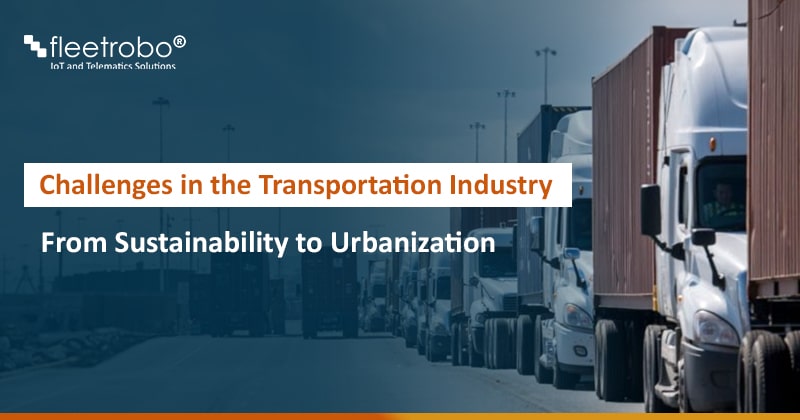Introduction
The transportation sector unquestionably holds a pivotal position within any industry’s supply chain. India boasts the world’s second-largest road network. This extensive network plays a pivotal role as the nation’s vital artery, facilitating the transportation of more than 64.5% of all domestic goods. But it is not without its challenges. The transportation sector faces immense pressure within the supply chain field. The numerous challenges in the Transportation Industry are placing certain inherent limitations on the entire Indian economy. So, overcoming issues in road freight transport is not only a priority but also a path for India’s sustainable future.
Challenges in the Transportation Industry
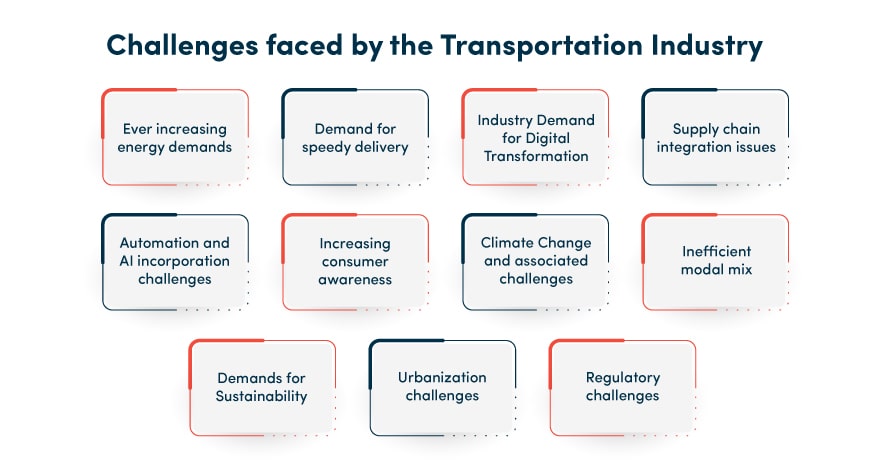
Escalating energy challenges in the transportation industry
Transportation, particularly the use of petroleum products, constitutes a significant portion of India’s energy consumption. The transport and logistics sector’s energy consumption are expected to continue rising due to various factors.
Such as economic and population growth, urbanization, rapid industrialization, increased agricultural development, higher demand for freight and passenger transport with e-commerce growth, and increased disposable incomes encouraging leisure travel. The energy dependency will also aggravate the foreign exchange burden for India and further complicate the freight logistics companies’ operation.
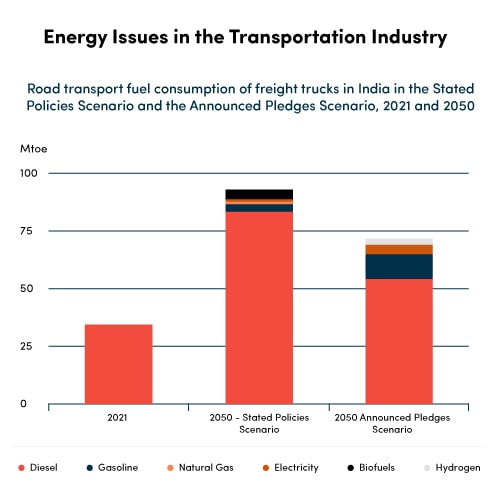
Issues with speed, delivery times, and legacy systems
The transport and logistics industry must navigate the challenge of transporting goods from point A to point B amid unpredictable circumstances. For example, festival time is the best example of mass delays in delivery schedules. Freight logistics companies are in a race to achieve a competitive edge by ensuring swift deliveries while grappling with the retention of legacy systems.
The transportation sector in India is characterized by a lack of organization and fragmentation, and it has a low level of literacy. There is a notable absence of automation within the logistics transportation sector in India that can pose challenges in managing traffic, planning routes, and resulting in increased fuel expenses and potential workforce attrition.
For example, a recent private survey revealed that 70 percent of logistics transportation firms consider the speed and precise estimated delivery times (ETD) as their primary challenges.
Industry Demand for Digital Transformation
Digital transformation entails evaluating a company’s conventional strategies and business models to identify ways to enhance its competitiveness in the digital realm.
However, adopting digital transportation practices can be a source of frustration for numerous transportation companies, as many of them continue to rely on traditional logs, records, and paperwork.
Supply chain integration challenges in the transportation industry
Globalization has significantly expanded trade, with products being bought and sold among various entities worldwide. To make this global trade function effective, the transport and logistics industry has had to scrutinize trade patterns, international politics, and the dynamic forces of supply and demand.
However, achieving supply chain integration goes beyond merely adhering to trade policies. Transport and logistic companies must also consider the various nodes within the supply chain to avoid data isolation.
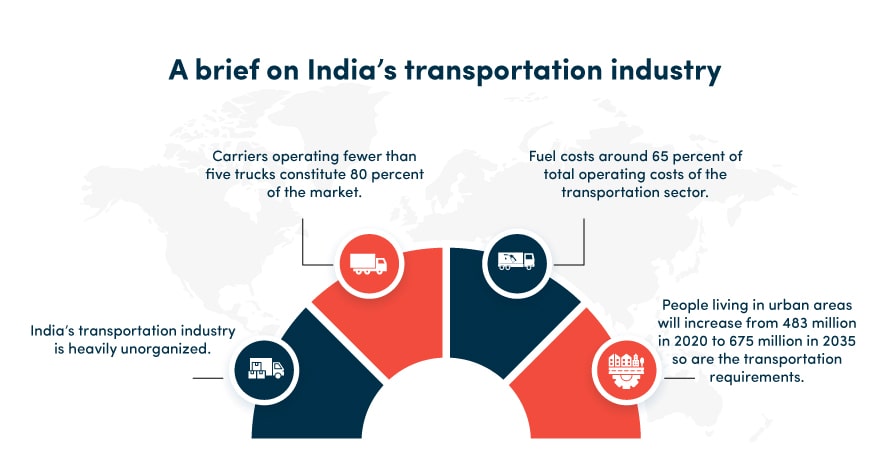
Challenges in harnessing automation and AI advancements
Automation and AI will play significant roles in shaping the future of transportation companies. They offer substantial advantages across various aspects, including order fulfillment, driver tracking, and product monitoring.
Moreover, consumer and client demands are driving the adoption of these advanced transportation methods. Nevertheless, determining the precise areas within a company that require automation the most can pose a challenge for the transportation sector.
Advancing consumer preferences
Consumer preferences evolve alongside advancing technology. Consumers are now more knowledgeable about transport and logistics and associated technologies than in the past.
As a result, their expectations have grown significantly, particularly in terms of communication and transparency. So, to deliver maximum value to consumers, the transportation industry must gain a deeper understanding of how emerging technologies influence the transportation industry.
Climate change and associated challenges in the transportation industry
Climate change has heightened atmospheric instability, resulting in a rise in convective phenomena, including thunderstorms, lightning, and heavy rainfall events. Meteorologists assert that cyclonic storms forming in the Bay of Bengal and the Arabian Sea are experiencing rapid intensification and maintaining their strength for extended periods now. So, while catering to diverse topography the road freight transport industry too faces inherent unpredictability.
In these situations, the transportation industry have to adhere to ESG Reporting and BRSR reporting norms as well.
Note: Dedicated solutions like Figbytes can help the transportation industry in its ESG reporting.
Furthermore, remote and inland regions suffer from poor road infrastructure, while mountainous areas like the Ghats are susceptible to accidents and landslides. The problem is further compounded by traffic jams, multiple checkpoints, and toll booths, leading to substantial time and financial setbacks for logistics transportation companies.
Modal mix and associated challenges in the transportation industry
In India, the primary mode of freight cargo transportation is road transport, representing almost 60% of all cargo movement. This dominance is largely a result of the congested railway networks and their high tariffs, which handle only about 32% of the cargo.
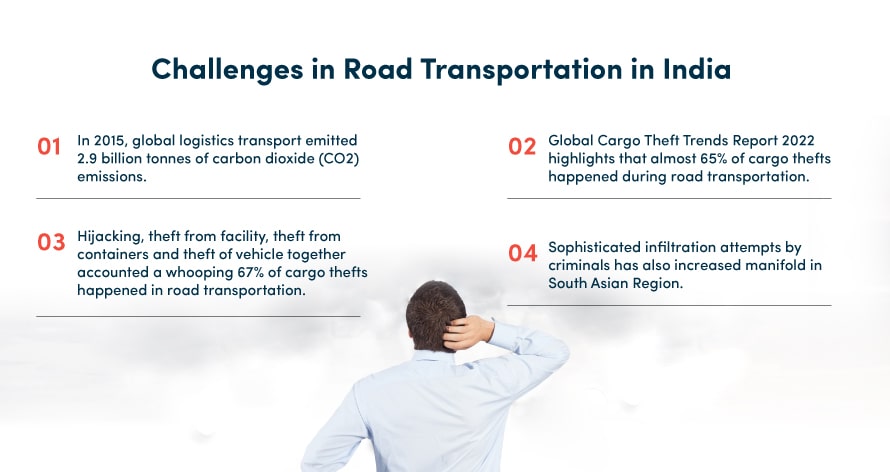
However, inefficiency is a common issue due to subpar road infrastructure, numerous checkpoints, and traffic congestion. Further transporting goods by road also opens an array of challenges. Such as cargo theft, fuel theft, vehicle theft, and lack of real-time visibility of transported goods.
Lack of Sustainability in the Transportation Sector
The transportation sector accounts for approximately 25% of global CO2 emissions. Furthermore, each year, air pollution-related complications lead to the loss of over 7 million lives, and road accidents claim an additional 1.3 million. So, the entire transportation sector is under tremendous pressure from international agencies to move towards sustainability.
But, in order to advance towards comprehensive sustainable development, the transportation sector must discover methods to reduce transport emissions while simultaneously enhancing access to economic opportunities.
Urbanization challenges in the transportation industry
According to World Cities Report 2022, by 2035, the percentage of the population in India at mid-year residing in urban areas will be 43.2% (From 483 million in 2020 to 675 million in 2035). This will increase the high-order intensity ratio from urban centres.
But along with that, the following challenges will also increase,
- As many cities lack bypass roads, trucks are required to pass through them,
- The traffic in urban areas will also grow and complicate road freight transport.
Trucks are prohibited from traversing the city during specific time frames. This will extend transit times from the point of origin to the destination city.
All these will create troubles for the transport and logistics industry to cater to this section of the population.’
Challenges with government regulation and tech
When moving goods by road, several regulatory criteria must be met. These include obtaining vehicle registrations, approvals, licences, and certificates. But even after that, various government officials such as Police, RTOs, and GST officials frequently halt vehicles for inspection, causing significant time delays. Further, they also demand speed money from the truck driver, which is unlawful. Further, despite the availability of Fast Tag, toll booth queues remain lengthy due to the prolonged processing time of electronic card readers.
A Multifaceted Approach for Revolutionizing Transportation
Addressing challenges in the transportation industry necessitates a multifaceted approach.
Facilitate digital transformation and automation
The transportation sector can modernize logistics and implement FleetRobo’s Logistics Process Automation. This will enhance efficiency, streamline operations, automate security checks and weighbridge, and also minimize errors to great extent. This will significantly help in speedy delivery, ensure supply chain integration, facilitate intelligence-driven analytical reports for performance improvement, etc.
Manage transportation’s fuel with precision
Companies can work on transition to sustainable fuels and electric vehicles (EVs) to reduce their carbon footprint. But that is associated with significant capital investment. So, the transportation sector can optimize their fuel usage through the integration of FleetRobo’s fuel monitoring system. This is crucial for cost-effectiveness and environmental impact reduction. The fuel monitor also has the capacity to generate advanced reports like mileage monitoring, ensure real-time tracking and notifications for fuel theft or abrupt fuel level change. This will make your transportation industry to ensure more precise fleet management & planning.
Encourage eco-friendly driving patterns with pocket-friendly cost
FleetRobo’s Video Telematics solution has High-Resolution cameras, Advanced Driver Assistance Systems (ADAS) capability, and a Driver Status Monitor (DSM). This AI-Based solution can improve the fleet’s safety by a whooping 65%. FleetRobo’s video telematics will generate Driver Behavior Analysis, monitor traffic violations in real-time, help in accident reconstruction, etc. Together, it can ensure an eco-friendly driving which is important not only for improving fuel efficiency but also prolong the life of mechanical components in your vehicles.
The system can be fitted into any conventional system with fraction of the cost. This will make the device pocket-friendly for the transportation industry. Further, you can also get route optimization so that your transport manager will know the best possible route to deliver the product in congested areas and hilly and remote locations.
Secure your transport
Ensuring safety is paramount for that, the adoption of technologies like FleetRobo’s GPS E-lock adds an extra layer of security to cargo transportation. The device enables you to access real-time information regarding the containers, including their present location, speed, recently achieved milestones, E.T.A., and more. The e-lock exhibits a 20% boost in operational efficiency compared to similar devices. To date, it has successfully thwarted over 15,000 incidents of pilferage and theft.
Conclusion
To avert the challenges in the transportation industry, the companies have to shift to sustainable fuels and EVs, modernize logistics transport networks, processes, and policies with Logistics Process Automation, Optimize fuel usage with fuel monitoring systems, and adopt eco-friendly driving patterns with enhanced video telematics, adopt technologies like GPS E-lock to ensure safety.
To get more details please visit the FleetRobo’s website.

